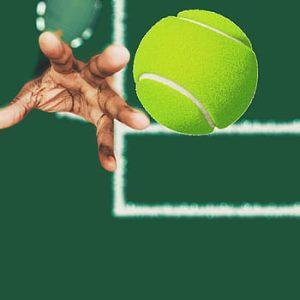We may earn money or products from the companies mentioned in this post.
Introduction

Have you ever wondered how some tennis players magically appear in tournaments without having to go through the qualifying rounds? Well, that’s where wild cards come into play In the world of tennis, a wild card is like a golden ticket that grants entry to a player who wouldn’t otherwise qualify based on their ranking or performance It’s an exciting opportunity for both the player and the tournament organizers Let’s dive deeper into this intriguing concept and explore its purpose and significance
The Concept of a Wild Card
A wild card in tennis refers to an invitation given to a player or players by tournament organizers to participate in their event, bypassing the usual qualification process Typically, these invitations are extended to local players, up-and-coming talents, or even renowned players who may have been sidelined due to injury or other circumstances
By offering wild cards, tournament organizers aim to inject excitement and unpredictability into their events It allows them to showcase promising talents or bring back beloved veterans who might attract more fans and media attention It also creates opportunities for players who may not have had access to certain tournaments otherwise
Purpose and Significance
The purpose of granting wild cards is two-fold: first, it adds an element of surprise and intrigue to the tournament lineup When unexpected players are added to the mix, it can create interesting storylines and generate buzz among spectators
Secondly, wild cards provide valuable opportunities for talented individuals who may not have enough ranking points or experience yet By giving them a chance to compete against higher-ranked opponents, they gain exposure and valuable playing time at a higher level of competition This exposure can be instrumental in their development as professional tennis players
Furthermore, wild cards can help boost attendance at tournaments as fans get excited to see their favorite local players or comeback stories unfold This increased interest can also attract sponsors and media coverage, benefiting both the tournament and the players involved
In conclusion, wild cards are a fascinating aspect of tennis that adds excitement, unpredictability, and opportunities for both players and tournament organizers It not only spices up the competition but also serves as a platform for rising stars and seasoned veterans to shine on the world stage So next time you watch a tennis tournament, keep an eye out for those wildcard entries who might just surprise everyone with their incredible skills
How Tennis Wild Cards Are Awarded

When it comes to tennis tournaments, wild cards are like golden tickets that grant players the opportunity to compete among the best in the world But how exactly are these coveted wild cards awarded? Let’s take a closer look at the criteria for selection and the types of tournaments that offer them
Criteria for Selection
Tournament organizers have various factors they consider when deciding who deserves a wild card entry These factors include:
-
Player’s Popularity and Marketability:
It’s no secret that tennis is not just about skill; marketability plays a significant role too Organizers often consider a player’s popularity, fan following, and potential commercial value when awarding wild cards -
Past Performances and Rankings:
Previous performances and current rankings also come into play A player who has had notable achievements or has shown consistent improvement may be more likely to receive a wild card -
Injury Comebacks:
Sometimes, players who have recovered from injuries or long breaks are given wild cards as an opportunity to make their comeback on the big stage -
Promising Young Players from Host Country or Region:
Tournaments often like to promote local talent by offering wild cards to promising young players from the host country or region This helps generate excitement among home fans and builds future stars
Types of Tournaments That Offer Wild Cards
Wild cards are primarily offered in two types of tournaments:
-
Grand Slam Tournaments:
The four prestigious Grand Slam events – Australian Open, French Open, Wimbledon, and US Open – allocate a few wild cards to deserving players each year These tournaments attract massive attention and provide an excellent platform for players to showcase their skills -
ATP/WTA Events:
Aside from the Grand Slams, various ATP (Association of Tennis Professionals) and WTA (Women’s Tennis Association) events also offer wild card entries These tournaments are part of the professional tennis circuit and allow players to compete against high-ranked opponents
Examples of Famous Wild Card Entrants
Every now and then, a wild card entrant creates headlines by making a remarkable run in a tournament One such inspiring success story is that of Goran Ivanišević, who won Wimbledon in 2001 as a wild card entry His triumph against all odds captured hearts worldwide and showcased the unpredictable nature of tennis
These examples only scratch the surface of the exciting possibilities that wild cards bring to tennis tournaments Whether it’s providing opportunities for aspiring talents or adding intrigue to the competition, these wildcard entries play an essential role in shaping the sport we love
Process to Apply for a Wild Card

Are you an aspiring tennis player looking for an opportunity to showcase your skills on the professional circuit? A wild card might just be your ticket to the big leagues In this article, we’ll walk you through the process of applying for a wild card and what you can expect along the way
Application process
The application process for a wild card typically involves several steps and requirements
-
Submission deadline:
Each tournament has its own specified deadline by which applications must be submitted It’s crucial to keep track of these deadlines and ensure that your application is sent in on time -
Required documentation and information about the player:
To apply for a wild card, you’ll need to provide certain documents and information about yourself This may include your playing history, rankings, achievements, and any other relevant details that can help showcase your potential -
Selection committee considerations:
Once all applications are received, a selection committee will review them thoroughly The committee will take various factors into account when making their decision, such as the player’s talent, potential marketability, previous performance, and overall impact they could have on the tournament
Possible outcomes after applying for a wild card
After submitting your application, there are two possible outcomes that you may encounter
-
Acceptance into the main draw or qualifying rounds:
If your application stands out among others and impresses the selection committee, you may be granted a wild card entry into either the main draw or qualifying rounds of the tournament This gives you an incredible opportunity to compete against top-ranked players and gain invaluable experience on the professional circuit -
Rejection:
Unfortunately, not all applications can be successful If your application is rejected, it’s important to remember that this doesn’t define your potential as a player Keep practicing, refining your skills, and seeking opportunities to prove yourself in other tournaments or events
Applying for a wild card can be an exciting and nerve-wracking process It’s important to stay focused, believe in your abilities, and present yourself in the best possible light through your application Remember, even if you don’t receive a wild card this time around, there will always be other chances to shine on the tennis court
Wild Card Pros and Cons

Advantages for both players and tournament organizers
When it comes to wild cards in tennis tournaments, there are several advantages for both the players and the organizers One of the key benefits is that wild cards offer an opportunity for talented players to compete at high-level events, even if they don’t meet the ranking requirements This allows young up-and-coming players or those returning from injury a chance to showcase their skills on a big stage
In addition, wild cards can contribute to increased ticket sales as popular players who receive these special invitations often have a strong fan base The presence of these well-known individuals adds excitement and draws more spectators to watch the matches, boosting revenue for tournament organizers
Disadvantages and controversies surrounding wild cards
While wild cards have their advantages, there are also some disadvantages and controversies associated with them One common concern is the perceived unfairness towards other deserving players who may be ranked higher but miss out on receiving a wild card invitation This can lead to frustration and resentment among these players, as they feel disadvantaged by the system
Another issue that arises is the potential misuse of wild cards by tournament organizers to favor local or well-connected players Critics argue that sometimes these special invitations are not given based solely on merit but rather influenced by external factors such as personal relationships or commercial interests This raises questions about transparency and fairness within the selection process
Useful Links

What Does Tennis WC (Wild Cards) Mean?
Wild cards
What does a wild card in tennis mean?
Tennis Ireland Wild Card Policy
How Do Wild Cards Work In Tennis?
Wild card (WC). Meaning in tennis. Definition. Wiki. Terms
Fils & Paire Receive Roland Garros Wild Cards
Wildcard application and selection process – Other ITF Pro …
Roland Garros Wild Card Challenge Standings Update
Tennis Clash Wildcard Bags Opening: Worth Buying? – YouTube
Who decides who gets a wild card? : r/tennis
First female wildcard to win a tennis grand slam
Andy Murray breaks record as he receives unexpected …
Australian Open 2023 wildcards: Which men’s and …
Solving the Wildcard Issue in Tennis
NCAA Singles Champion Quinn Earns US Open Wildcard
Tennis: Venus Williams gets wild card entry to Wimbledon …
What is a wildcard in tennis?
Navarro, Kypson win USTA’s French Open wild cards






